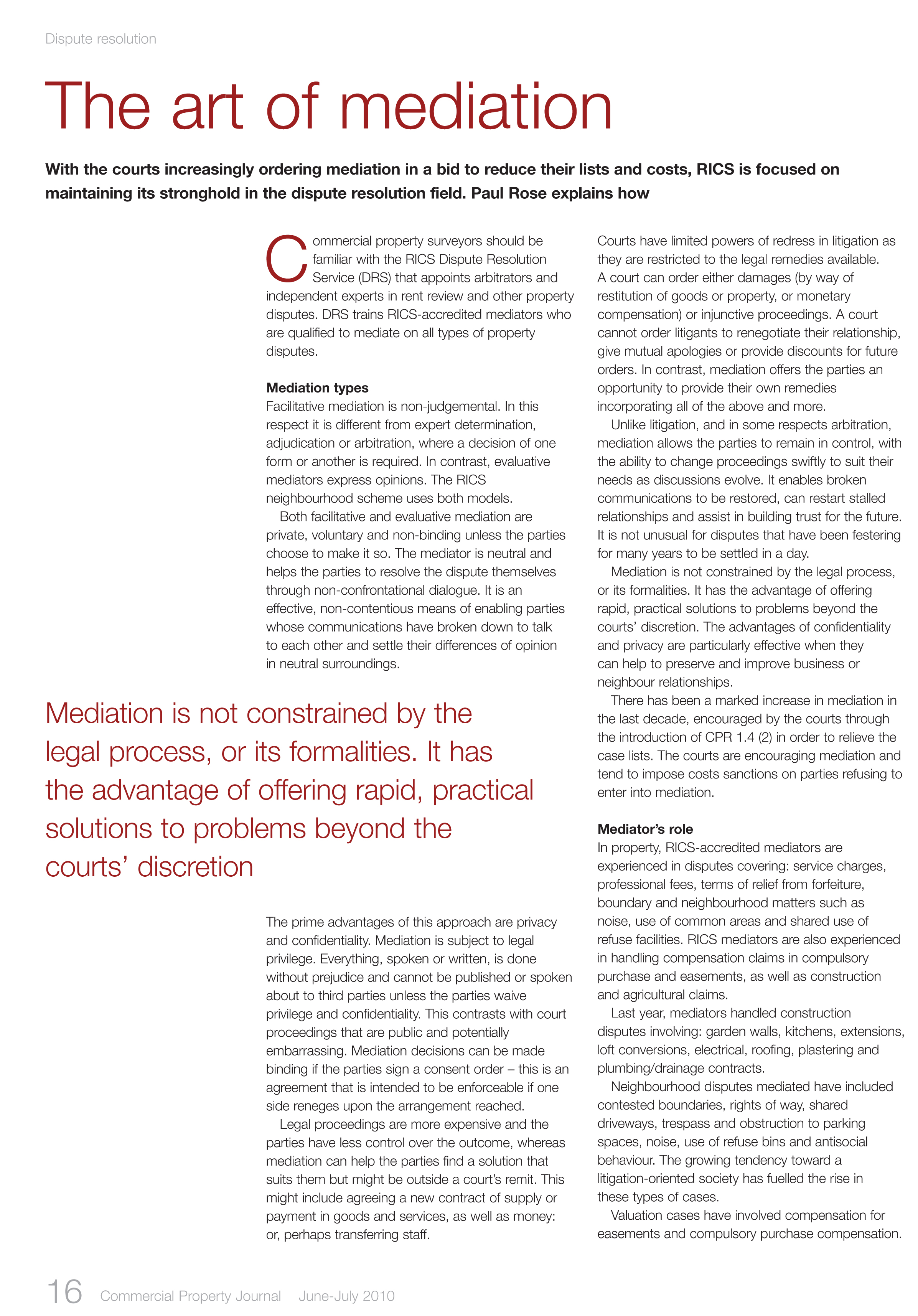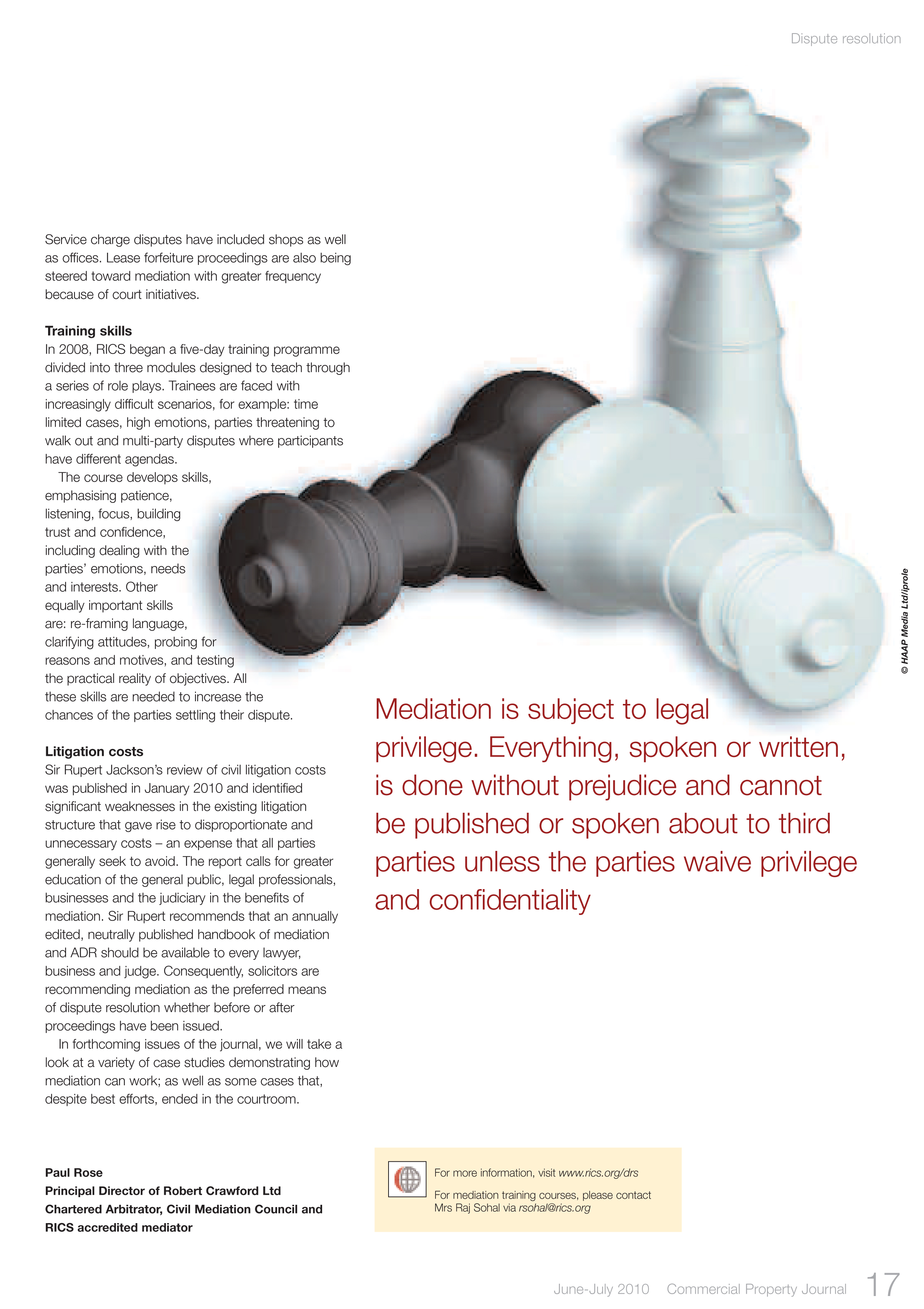The ADR approach in lease renewal disputes – As Featured in the Solicitors Journal
Article Featured in The Solicitors Journal
The changing economic climate means that arbitration is increasingly becoming a preferred method of dispute resolution in lease renewals, explains Paul Rose
Contested statutory commercial lease renewals, unlike rent reviews, are usually dealt with by the courts being subject to the Landlord and Tenant Act 1954 (as amended). These disputes fall into two principal categories, namely the terms of the new lease and the rent. It is common knowledge that the majority of court time spent on these disputes focuses on the expert rental evidence but there is often considerable discord about the terms of the new lease.
In commercial rent reviews, contested rental opinion can be settled by arbitration or expert determination. What is less well known is that there are institutional schemes that have been created with a view to reducing court time and costs in lease renewals. It has been suggested that the infrequent use of these schemes is a desire by larger landlords to retain the threat of the costs of court proceedings to support their negotiating position. However, since arbitrations are not complete without awards on costs, that proposition is less probable than a simple lack of awareness of the existence of these schemes.
Around 12 years ago, a scheme was set up by the Law Society and the Royal Institution of Chartered Surveyors (RICS) appositely entitled ‘Professional Arbitration on Court Terms’; better known by commercial surveyors by the acronym, PACT.
The Chartered Institute of Arbitrators (CIArb) property disputes scheme also offers a similar service appointing experienced chartered surveyors who are also chartered arbitrators in such cases.
Such schemes are supported by the civil procedure rules which stipulate that alternative dispute resolution (ADR) must be considered before litigation, on penalty for costs for failing to comply.
Cost-effective solutions
These schemes offer a rapid, efficient and cost-effective solution not only to the rental element, but also the terms, without the need to proceed to court. The advantages of arbitration are generally well known; specifically they are speed, privacy, choice of dispute resolver, choice of hearing venue, choice of procedure, cost, and absence of the protocols and other legal formalities associated with the civil procedure rules and the courts.
The biggest advantage of such schemes is that it provides the opportunity to have the new lease terms and rent decided by a surveyor with specialist knowledge and experience of these cases. They tackle a number of issues including lease length, interim rent, initial rent, rent reviews, break clauses, alienation clauses and service charges.
Lease renewals fall within the Landlord and Tenant Act 1954 which require a tenant to comply with a timetable for applying to the court to renew the tenancy. Thus, court approval was and still is required to refer a lease renewal to arbitration.
If the parties decide to refer their lease renewal to arbitration or independent determination the main issues on which they need to agree are:
• matters in agreement;
• matters not in agreement and on which they require an arbitral award or determination; and
• whether the determination is by an arbitrator or independent expert.
The Regulatory Reform Order 2003 allows the parties to agree to extend the deadline for the court application under the 1954 Act. Consequently, lease renewal negotiations can now be accomplished without court proceedings needing to be issued. Unless a case has already commenced in an originating application, thus requiring a Consent Order, parties are no longer required to obtain a consent order from the courts before deciding to opt for ADR.
Determination by PACT
Procedures for a determination by PACT are similar to those used in rent reviews. Holding a preliminary meeting is desirable in order to ascertain whether issues other than rent should be decided as preliminary issues. Thereafter, dealing with the rental issue can usually be accomplished by an exchange of written representations followed by replies; then a determination or arbitration award is made on rent.
If the route is arbitration, an award on costs becomes necessary. Of course parties are bound by arbitral awards and can agree to be bound by expert determinations. Both should be properly recorded.
Despite the age of existence of these schemes, there are still very few institutional appointments. Most cases originate as private appointments. The driving factor is the present economic climate where leases now tend to be quite short, usually between five and ten years in duration; as opposed to the historically recognised institutional leases of 25 years duration, albeit with rent reviews.
The reduction in lease lengths became a market phenomenon about five years ago. As a result, the original lease terms for tenancies protected by the legislation are now being renewed. Therefore, the market is experiencing more frequent lease renewals that are rapidly catching up with the frequency of rent reviews.
Coupled with costs and time frames in mind, there is a growing tendency to keep the renewal out of court. This provides fertile ground for an increase in applying less time consuming and cheaper alternative dispute resolution.
The lack of recognition of the advantages of arbitration, i.e. speed, flexibility and informality is disappointing. With arbitration or expert determination a third party is not required to operate according to court availability. In contrast, with court proceedings, it often takes several months after a claim is commenced before the issue of directions. The backlog of cases and other inefficiencies usually translate to even slower progress thereafter with a trial often taking place some 12 to 15 months thereafter.
With PACT proceedings that time scale can be considerably shortened to perhaps six months at the most, especially if the parties can agree upon their appointment of a third party. However, CIArb and RICS are now very efficient and rapid in making appointments after application is received.
Despite PACT involving the additional cost of a third party neutral, the overall cost of proceeding through these schemes should still cost less overall because the parties are usually able to manage the process more efficiently and informally. This is especially so if the chosen process is by written representations, an option not available with the court process.
Hopefully, the concept of parties referring lease renewals to arbitration by the courts under consent orders, or else, by private appointments in place of originating applications will increase. Not only would that lift the burden on already overstretched public court services but will bring the parties certainty much sooner in their dispute.
Paul Rose FRICS C.Arb is a member of the presidents’ panel of arbitrators of both CIArb and RICS and is a member of ArbDB Chambers. He specialises in property disputes.


